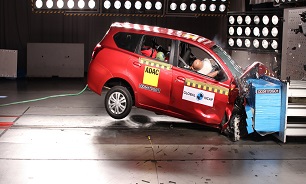Low-cost vehicles sold in developing markets are rarely paragons of safety, because making key body stress points from high-grade materials, and adding lots of safety equipment, is expensive.

Khodrocar - Yet there appears to be a significant differential in crash safety that should worry anyone who believes in big car-makers taking some semblance of corporate responsibility for people who buy their cars, and who wants published crash scores mandated globally.
Global NCAP – the group that oversees organisations such as Australia’s ANCAP – and South Africa’s AA, this week released results from what they claim were the first independent crash tests of some of the country’s most popular compact and small cars.
The results have prompted calls for a UN-mandated global minimum safety standard, and to OEMs to commit to making their cars safer, even if regulators aren’t forcing them.
The models tested include South Africa’s best-selling car, the VW Polo Vivo. Others tested were the Datsun Go+, Toyota Etios, Renault Sandero and Chery QQ3. Combined sales of these five cars account for around 65 per cent of all the new cars sold in SA last year.
Global NCAP says it chose the entry-level version of each model, one of them not fitted with any airbags as standard. The results highlighted differences in the structural integrity of the vehicles tested.
The results are pretty confronting, as are similar test findings from NCAP’s forays into India and ASEAN. Safer than a motorbike? Maybe. But is that the bar we want to set?
Source: Car Advice
Latest News


